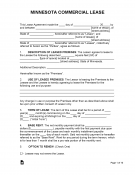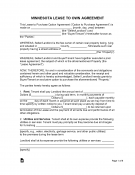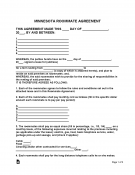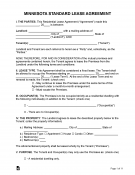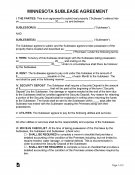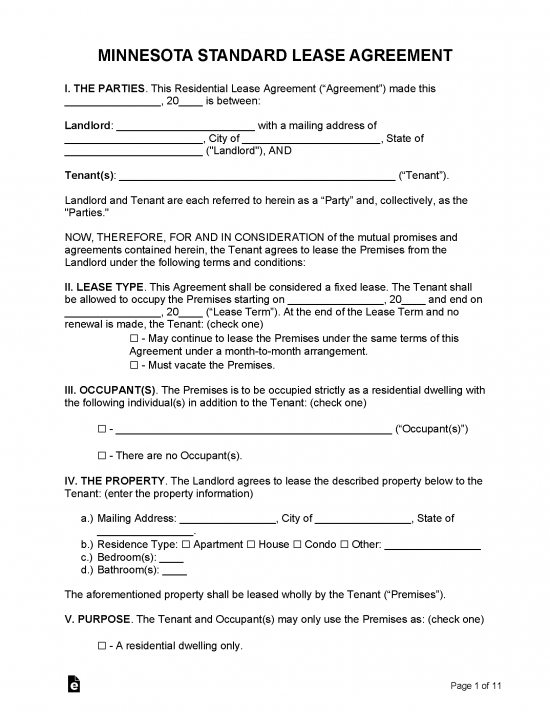Minnesota lease agreements set the terms of a tenant’s lease of a landlords property. They are written documents that will name the expected rent, the responsibility for utilities, and other obligations of the parties. Both the landlord and the tenant should keep a copy of the lease agreement, and refer to it in case of disagreements in order to prevent more extensive disputes.
Contents
- Minnesota Lease Agreements: By Type (6)
- Landlord-Tenant Laws
- Handbooks and Guides
By Type (6)
- Commercial Lease Agreement
- Month-to-Month Lease Agreement
- Rent-to-Own Lease Agreement
- Roommate Lease Agreement
- Standard Lease Agreement
- Sublease Agreement
Download: Adobe PDF, MS Word, Rich Text Format
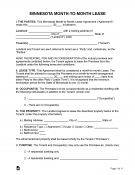 Month-to-Month Lease Agreement
Month-to-Month Lease Agreement
Download: Adobe PDF, MS Word, Rich Text Format
Download: Adobe PDF, MS Word, Rich Text Format
Download: Adobe PDF, MS Word, Rich Text Format
Download: Adobe PDF, MS Word, Rich Text Format
Download: Adobe PDF, MS Word, Rich Text Format
Landlord-Tenant Laws
Statutes – Property and Property Interests, Chapter 504B (Landlord and Tenant)
Required Disclosures (5)
Covenant of Landlord and Tenant Not to Allow Unlawful Activities – All residential lease agreements in Minnesota must include the following words (§ 504B.171):
Landlord and tenant promise that neither will unlawfully allow within the premises, common areas, or curtilage of the premises (property boundaries): controlled substances, prostitution or prostitution-related activity; stolen property or property obtained by robbery; or an act of domestic violence, as defined by MN Statute Section 504B.206 (1)(e), against a tenant, licensee, or any authorized occupant. They further promise that the aforementioned areas will not be used by themselves or anyone acting under their control to manufacture, sell, give away, barter, deliver, exchange, distribute, purchase, or possess a controlled substance in violation of any criminal provision of Chapter 152.
Financial Distress – If the landlord’s property is being foreclosed upon or a deed of cancellation has been issued, the lease agreement cannot allow for a lease extending longer than two (2) months (§ 504B.151).
Landlord/Manager Information – The landlord must disclose the names and contact information for agents, such as a building manager, authorized to receive complaints and to come on to the premises to make repairs (§ 504B.181).
Lead-Based Paint Disclosure – For leases of any property with a dwelling unit erected before 1978, the landlord must warn the tenant about the risks associated with lead-based paint.
Outstanding Inspection Orders – If the property is in a condition that leaves it subject to violations of local inspection ordinances, these conditions must be disclosed in the lease agreement (§ 504B.195).
Security Deposit Laws
Maximum Amount ($)
There is no statutory maximum for what a landlord may charge as a security deposit. However, if a landlord seeks a “pre-lease deposit,” the landlord must apply this amount to any security deposit sought(§ 504B.175).
Returning to Tenant
If a landlord sought a security deposit as a condition of a lease, the landlord must return the deposit to the tenant within twenty-one (21) days of the termination of the lease. It is the tenant’s responsibility to provide a new address to which the deposit will be sent. A landlord may retain a portion of a security deposit only for the following reasons: to recoup unpaid rent; to remedy damage to a dwelling unit that occurred during the tenancy, beyond that caused by normal wear-and-tear; and to account for unmet obligations that were included in the lease agreement, such as an unpaid utility bill. If the tenant disputes the amount deducted from the security deposit, the tenant may challenge the amount in court, where the burden is on the landlord to prove that the amount retained was justified (§ 504B.178).
When is Rent Due? (grace period)
Minnesota law does not set a date on which rent is due, meaning that landlords and tenants may set a due date in the lease agreement. State law also does not mandate a grace period.
Eviction Notice (non-payment)
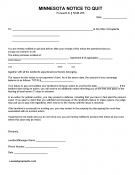 Notice to Pay or Quit – If rent is not paid on the date due, the landlord or an agent may post this notice on the dwelling unit informing the tenant that the landlord may begin eviction proceedings. A landlord can file for eviction immediately unless the lease agreement says otherwise. (Tenants who are renting a property without a lease agreement, an arrangement known as a “tenancy at will,” must be given fourteen (14) days notice.) Although the landlord may immediately file for an eviction, the tenant must receive at least seven (7) days’ notice before any hearing, and may remain in the unit even if the eviction is successful by paying the rent owed plus the landlord’s court costs before the landlord takes possession. (§ 504B.285)
Notice to Pay or Quit – If rent is not paid on the date due, the landlord or an agent may post this notice on the dwelling unit informing the tenant that the landlord may begin eviction proceedings. A landlord can file for eviction immediately unless the lease agreement says otherwise. (Tenants who are renting a property without a lease agreement, an arrangement known as a “tenancy at will,” must be given fourteen (14) days notice.) Although the landlord may immediately file for an eviction, the tenant must receive at least seven (7) days’ notice before any hearing, and may remain in the unit even if the eviction is successful by paying the rent owed plus the landlord’s court costs before the landlord takes possession. (§ 504B.285)
Download: Adobe PDF
Maximum Fees ($)
Late Rent Penalties
If a landlord wishes to impose a fee for providing rent late, the landlord must name the fee in the lease agreement. The fee cannot exceed eight percent (8%) of the monthly rent (§ 504B.177).
NSF Checks
Minnesota law does not specify a fee that landlords may set for a tenant providing a rent check with insufficient funds to carry it, but best practice is for the fee to be identified in the lease agreement and for the fee to be reasonable.
Tenant’s Unclaimed Property
If, after the conclusion of a lease, personal property of the tenant remains in the dwelling unit, the landlord must store and care for the property left behind. The landlord may sell the property after waiting at least twenty-eight (28) days, but must attempt to notify the tenant in writing at least fourteen (14) days before any sale takes place. The landlord may use the proceeds of the sale to settle debts owed by the tenant, as well as to offset the cost of storing the property. Any remaining funds must be provided to the tenant, if the tenant requests them(§ 504B.271).
